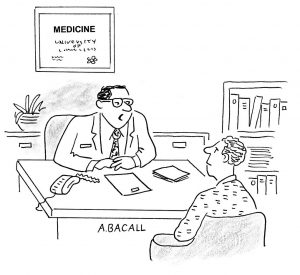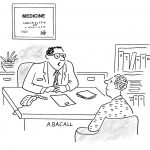
Atrogenic harm is a matter of significant concern in Nigeria and in many parts of the world today, and appropriate application of the law of negligence is an important part of ensuring accountability through the legal system. Although of limited application over the years, due to a variety of socioeconomic and cultural factors, the law of medical negligence is by no means new to Nigeria. There are substantial examples of cases prosecuted through the Nigerian courts,dating as far back as the 1960s.
With increasing patient awareness, the burgeoning use of social media and involvement of agencies such as the
Consumer Protection Council (CPC), there is an increasing likelihood of medical negligence law becoming a widely utilised tool for holding the medical profession, including doctors and allied health practitioners, to account.
allied health practitioners, to account. This article explores the evolution of medical negligence law in Nigeria and the challenges

that exist in deploying this instrument as an effective lever for accountability throughout the healthcare sector.
Medical Negligence and the Law in Nigeria
Numerous accounts of harm caused to patients by the negligent conduct of members of the medical profession have been recorded over the years. Nigerian law provides for the offence of medical negligence within the criminal law and therefore allows for a health professional to be charged with the offence of gross negligence
Cases such as Akerele v R. (1941) illustrates that a doctor can be charged and convicted of acting illegally. The tort of negligence covers situations where medical personnel have acted without due care and caution and below the standard of skill expected of a medical professional and which has resulted in harm.Nigerian cases, from Igbokwe v University College Board of Management (1961) to more recent cases like Abi v CBN (2011), indicate that medical negligence as a civil matter is by no means new to our legal system.
Several cases tried in the English court, such as the locus classicus – Bolam v Friern Hospital Management Committee (1957), which established the standard for evaluating a doctor’s skill, allowing this to be adjudged by
whether the conduct or omission of the doctor was such as to be acceptable by a significant number of their peers; and the qualifying case of Bolitho v. City and Hackney Health Authority (1997), have been adopted in Nigerian medical jurisprudence.
Apart from litigation under tort law and criminal charges under the criminal law, most professions have disciplinary mechanisms that ensure that members of such professions adhere to specified standards of conduct.
Under the Medical and Dental Practitioners’ Act, a Council is established which has the power to, amongst other things, provide for the standards of conduct of medical and dental practitioners.
The current Code of Medical Ethics (2008) contains the standards expected of medical and dental practitioners in several areas. This includes standards for informed consent, confidentiality, diagnosis, referrals, etc. It also
provides circumstances under which the conduct of a doctor or dentist may be considered an act amounting to infamous conduct in a professional sense.
These may include negligent acts such as failure to diagnose properly, failure to refer where necessary, failure to see a patient as
This defect in the Tribunal system effectively opens the door to litigation,in most cases,a more tedious and adversarial process
often as their condition requires, incompetence in the assessment of a patient, failure to advise appropriately or proffering the wrong advice, failure to obtain informed consent, medical errors in treatment, etc.
The Medical and Dental Practitioners’ Act also provides for the disciplinary process – a twostep process requiring investigation by a duly constituted Investigating Panel and subsequent trial by the Medical and Dental Disciplinary Tribunal.
The Tribunal is placed by the Act on the level of a High Court, distinguishing it from other professional disciplinary tribunals of its kind.Appeals arising from the Tribunal, are therefore referred directly to the Court of Appeal. The Tribunal is headed by the Chairman of the Council who is appointed by the President on the recommendation of the Minister of Health.Under the Medical and Dental Practitioners’Act, the Tribunal can impose several penalties for medical negligence, ranging from admonishment/caution to suspension and in extreme cases, permanent removal of the medical practitioner in question from the medical register (being ‘struck-off’). This
process offers an alternative path for an aggrieved patient which ought to be shorter in time and in which the doctor is ‘judged’ by a panel of their peers.
However, the aim of this process is to ensure professional discipline and good medical practice and as such, the patient is not awarded any form of material compensation through this route. Compensation of this kind will only be possible through a civil action in the suit or when ordered by a judge in a criminal charge.
In summary therefore, patients who have suffered harm during treatment can rely on the mechanisms provided by the criminal law, the civil law of torts and code of conduct guiding professional practice and discipline. These
mechanisms follow different procedures with the possibility of varying outcomes in accordance with pre-defined objectives.
Evolution of Medical Negligence and the Law
Despite the longstanding recognition of medical negligence as an effective instrument in Nigerian law, medical negligence law has remained a significantly under-developed area of practice in Nigeria. Few cases have been brought before the courts and the success rates for claimants have been relatively low.
Many factors have been responsible for the limited number of cases brought to the attention of the courts –cultural and religious inclinations which cause people to “leave all to God”, delays in obtaining legal remedies
through the courts, costs of litigation, limited awareness of patients’ rights and a pervasive culture of “doctor knows best”, are important reasons for the current state of affairs.
However, this situation seems on the cusp of changing and several examples pointing towards this change are reported in Nigerian newspapers throughout the year. The advent of social media has also provided a platform for
many of these cases to become more widely discussed. These media typically feature complaints from patients and relatives followed by rejoinders from hospitals seeking to ‘clarify’ the circumstances under which patients have
experienced harm as a result of treatment received under their care.
More of these cases are beginning to make their way to the courts. In my practice as a health lawyer, I have observed an increasing interest in pursuing such cases through the courts. Reports also suggest that the Medical
and Dental Council of Nigeria is receiving an increasing number of reports of medical negligence.
Involvement of government agencies like the CPC, with a mandate to promote consumer protection and patient safety standards, is likely to increase redress-seeking amongst the general population and support overall, for a
culture of accountability throughout the health sector.
Key Challenges
Despite the definite move towards change evident in this area, the challenges of limited awareness and a cultural tendency not to seek redress persists on the part of patients in general.
One of the major challenges faced by this progress is the absence of a credible alternative to litigation. Unfortunately, for several years, the Medical and Dental Council of Nigeria has been limited in its ability to play its role effectively as a regulator.
Although the Investigating Panel has recommended several cases for adjudication by the Tribunal, it has not been possible to proceed with these cases due to the fact that a Chairman of Council has not been appointed by the Minister. In consequence, there is currently a backlog of cases, effectively eliminating one of the key accountability options available to patients.
There are many advantages to a functioning disciplinary process. The Tribunal is composed of a panel of the medical practitioner’s peers,likely to be in a position to understand the exigencies, complexities, and challenges of the health condition under discussion and of the limitations imposed on the practice of medicine in Nigeria.
The disciplinary process is a key pillar of selfregulation,albeit under the shadow of the law.Several cases in Nigeria have ruled that a doctor appearing before the Tribunal is entitled to be represented by a legal
practitioner of their choice and that the rules of fair hearing must be complied with in every case.
A doctor who is not satisfied with the ruling of the Tribunal may proceed to appeal. However,in view of the current absence of a functioning Tribunal, this door to a faster process of resolution for patients appears very firmly shut indeed! This defect in the system effectively opens the door to the option of litigation,which is most certainly in most cases, a more tedious and adversarial process.
A balance must be struck between accountability and learning; between recognition for great care and penalties for reckless and negligent behaviour
There is also the problem of a lack of statistical data regarding medical negligence cases at all levels of the health service. While it is the case that (individual) State Health Service Commissions have some information
concerning doctors who work in governmentrun health facilities, such information is not usually coordinated in a way that provides clear data on the root causes of medical negligence cases or takes advantage of key learning opportunities necessary to improve patient care.
The aim of medical negligence law is not to place medical practitioners on the defensive,but to ensure accountability, improve patient trust in the healthcare system, and ultimately enhance patient outcomes. A marked
improvement in the handling of medical negligence cases has the potential to embed and nurture a culture of patient safety. It is however possible that a culture of ‘defensive medicine’ may develop instead, in response to the method of handling of these cases whenever referred for review.
Finding the right balance is hugely important –a balance must consistently be struck between accountability and learning; between recognition for great care and penalties for reckless and negligent behaviour.

Health/medical law is an area of practice which had not attracted a great deal of attention from Nigerian lawyers over the years. Although some general practitioners already undertake an appreciable level of practice in personal injury law, a general lack of knowledge in this area combined with limited financial incentives and
absence of guaranteed income from patients who have already suffered harm and significant loss of earnings, are further reasons for the relative lack of interest shown by lawyers in this area of practice.
A closing of ranks among medical practitioners and consequent shortage of doctors prepared to serve as expert witnesses very often represents a death knell for any promising cases that could potentially reach the courts.
Having said this, it is important to generate the necessary interest and involvement within the legal profession as a means of contributing towards improved patient safety standards and sustainable systems of accountability throughout the healthcare delivery sector.
In Conclusion
Using the blunt instrument of the law should come with some consideration for the prevailing context and prior application of other strategies geared towards resolution.Employing the disciplinary process is one of the key strategies that must be implemented. A functioning Tribunal is an essential part of this process and every effort ought to be made by the medical profession in Nigeria to guarantee the effectiveness of this institution.
The instrument of law must remain on the table in order to prevent impunity, deter negligent behaviour and ensure accountability. There is a crucial need for capacity-building for healthcare professionals on the requirements of the law.There must be an understanding of the ethics of the profession to enable provision of effective and safe care to patients, without falling foul of the necessary protective and stringent requirements of the medicolegal environment.
read moreDisclosure forms provided by the author are available at NEJM.org.
Editor’s note:
Author Affiliations
Supplementary Material
| Disclosure Forms | 83KB |
Add your Comment
Add your Comment
Leave a Reply
You must be logged in to post a comment.
BHQJ 2018 ; 001:34-36
Related Article 
Medical Negligence & the Law5th May 2018 . Atrogenic harm is a matter of significant concern in Nigeria admin
Colorectal Cancer Overview5th May 2018 . [dkpdf-columns columns="3" equal-columns="false" gap="10"] Introduction Colorectal cancer is a major admin
Funding Healthcare Services in Nigeria – A conundrum of demand, policy and supply!5th May 2018 . [dkpdf-columns columns="3" equal-columns="false" gap="10"] Doctor, I happy say na you admin
5 “Provocations” of Healthcare Quality Reform6th May 2018 . [dkpdf-columns columns="3" equal-columns="false" gap="10"] n the four decades since he admin
Health Insurance, Activism & Urgent Change6th May 2018 . [dkpdf-columns columns="3" equal-columns="false" gap="10"] AR: Dr Soyinka, it’s wonderful to admin
Anne Olowu talks about her “Masterclass” experience6th May 2018 . [dkpdf-columns columns="3" equal-columns="false" gap="10"] As I suspect is the case admin
Stomach & Oesophageal Cancer in Nigeria6th May 2018 . [dkpdf-columns columns="3" equal-columns="false" gap="10"] Gastric and Oesophageal (Upper GI) cancers admin
Setting out the Stall!7th May 2018 . [dkpdf-columns columns="3" equal-columns="false" gap="10"] "The drawbacks of our false knowledge admin





Leave a Reply
You must be logged in to post a comment.